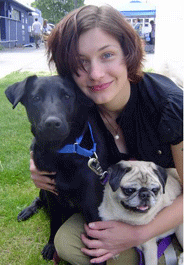Vet Student Recognized For Thinking "Outside the Box"July 7, 2009 When Nicole Putney began her studies at Washington State University (WSU) College of Veterinary Medicine two years ago, she knew she would have issues with the use of animals for training. At the top of Nicole's list of concerns were the use of colony dogs—dogs housed at the university and used repeatedly for teaching purposes—and terminal surgeries, in which animals are euthanized rather than recovered after surgery. Often, students who advocate for more humane veterinary training face opposition by faculty and students who don't want to change the status quo, but Nicole broke through the roadblocks she encountered and inspired some major changes at WSU this year. Thinking Outside the Box Nicole Putney with her rescued pug Smokey and Olive, a former colony dog at WSU who she adopted. Matthew Lapora In recognition of her work, Nicole was awarded the Outside the Box scholarship in April. The WSU scholarship—created by Dr. Nancy Merrill, a 1997 WSU graduate—is awarded to a veterinary student who has initiated positive change on campus by thinking "outside the box." Dr. Merrill says she created the award because she "believe[s] it is important to be involved and to improve whatever you do, wherever you are, even if it sometimes upsets the status quo." Nicole's instructors and veterinary colleagues agree that the award is a perfect fit for this dedicated veterinary student. "Nicole is tireless in both her pursuit of compassionate care and in her desire to recruit others to the same mission," commented Dr. Tammy Grubb, an assistant professor of anesthesiology at WSU. Dr. Tracie Romsland, a clinical pathology resident at WSU who worked with Nicole in class, provided some additional insight on why Nicole was honored. "Humane education should be at the forefront of the veterinary curriculum. Nicole has been very positive in her interactions and has worked hard to come up with solutions rather than just state dissatisfaction with the status quo. It makes such a difference to be able to provide possible solutions to some of the challenges we face, rather than to just criticize." The biggest change Nicole has been involved with is WSU's decision to stop using colony dogs in its required veterinary courses, effective next year. Traditionally, colony dogs were used in two required courses—anesthesiology and theriogenology—and after three procedures, the dogs were euthanized. Knowing there were more humane options that would allow students the same learning opportunities, she worked with faculty to implement alternative options. In the anesthesiology course, Nicole helped create an alternative track in which shelter dogs are anesthetized to be neutered by third- or fourth-year students, and then returned for adoption. Dr. Grubb believes the changes will give the university "a unique chance to re-develop our laboratories with what we hope will be intellectually stimulating and effective learning modules." More To Be DoneWSU has made great strides in advancing humane veterinary training by eliminating the use of colony dogs in required courses, but there are still some changes to be made. Terminal procedures are still in place in one soft tissue surgery elective course, and while the alternative of a willed body cadaver option is available to students, few select this option. Also, Nicole believes approximately 20 shelter animals are used yearly for the freshman anatomy course, and she feels the implementation of an Educational Memorial Program (EMP) would meet the school's need for both the anatomy and other elective courses by providing donated cadavers. She has shared her thoughts and resources for starting a program with faculty, and while there is some support for creating an EMP, the general consensus is that it isn't a viable option for WSU at this time. Nicole still hopes an EMP is in the school's future, and she plans to write her senior paper about the history of terminal surgeries and available alternatives in order to inform future vet students about other training options. Perseverance Pays OffThanks in no small part to Nicole's perseverance, WSU has made important advancements in the humane care and treatment of animals used in veterinary training. "She was instrumental in bringing this issue to the forefront," asserts Dr. Romsland. "We are lucky to not only have proactive, motivated students such as Nicole, but also receptive and progressive faculty!" The changes with which Nicole has been involved inspire hope that progress toward more humane training at WSU will continue. Nicole Putney is a veterinary student and HSVMA student chapter representative at Washington State University College of Veterinary Medicine. She will graduate in 2011. |
